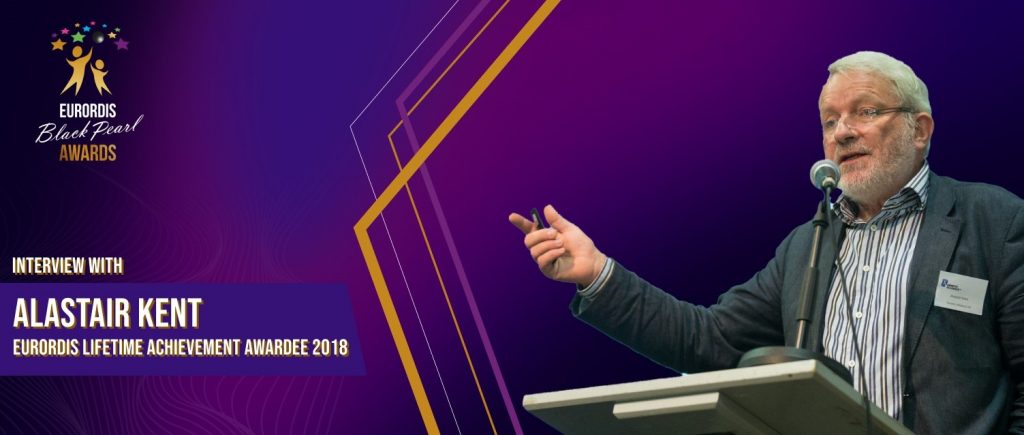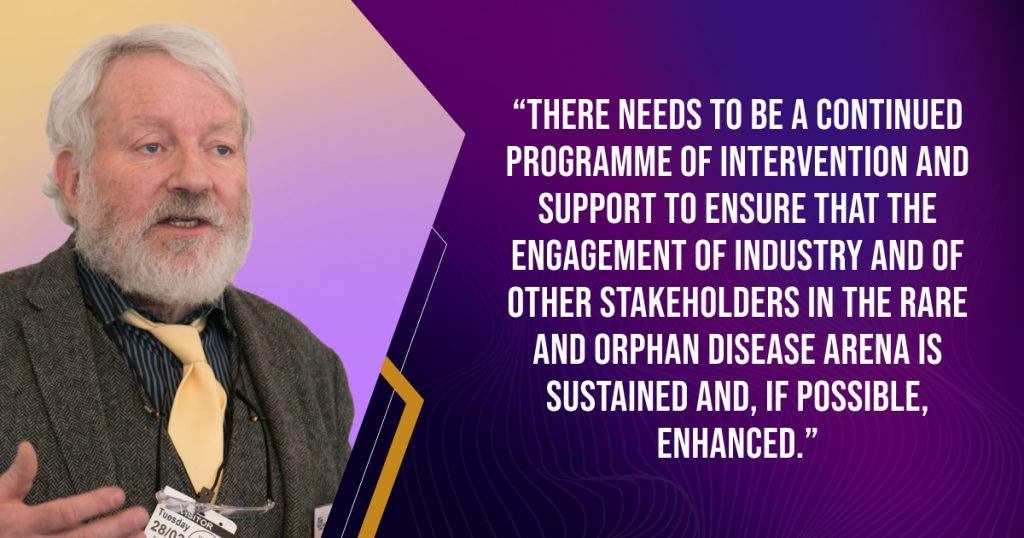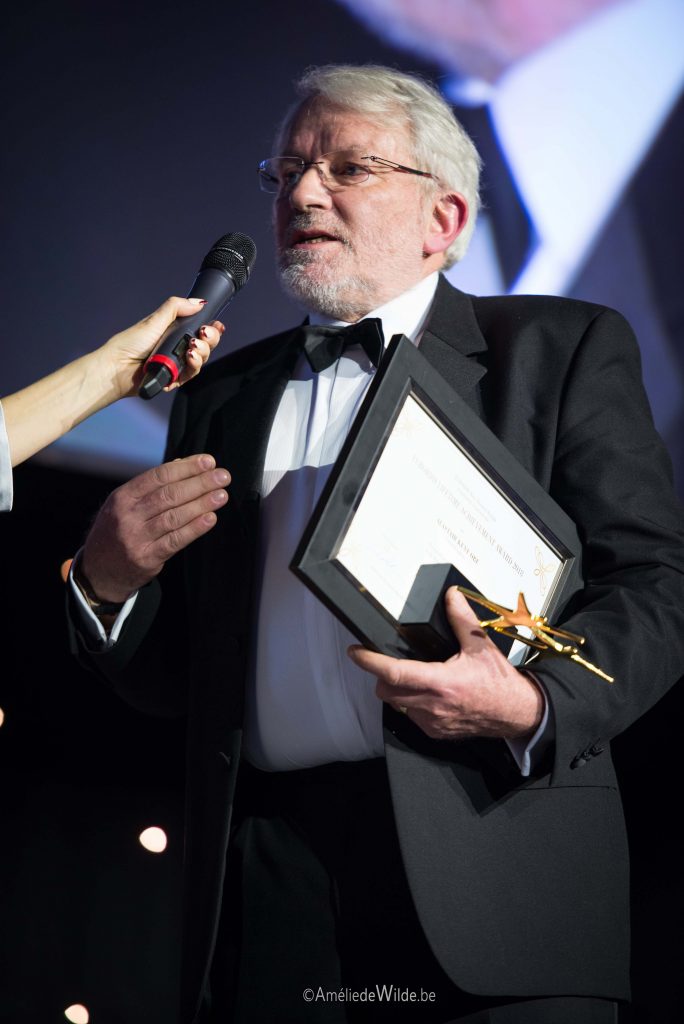‘Yesterday’s science fiction is tomorrow’s clinical service improvement’: An Interview with Alastair Kent OBE
June 2023As we look towards the 2024 edition of the Black Pearl Awards, we have been catching up with some of our past Black Pearl Awardees. In an interview with Alastair Kent OBE, former Executive Director of Genetic Alliance UK, we discuss his path into advocacy, the EU’s progressing legislative reforms to the Orphan Medicinal Products Regulation, mental wellbeing in the rare disease community, and access to treatments.

When it comes to rare disease research and advocacy, Alastair Kent regards his path into the sector as a form of serendipity. While working in the UK’s disability field, he had always been interested in how new insights and knowledge can lead to positive change, but he found that there was a palpable lack of interest in how disabled people can play a full and active part in society. This determination to make more of a direct difference, combined with some experience within his own family of the diagnostic odyssey, left Alastair feeling that the opportunity to join Genetic Alliance UK as its first and only full-time employee ticked a lot of boxes. Little did he know that the genetics domain was about to undergo tumultuous change.
“At times, it felt like I was sitting on top of the volcano as it erupted, because suddenly all this genetic and genomic possibility was bubbling away under me, pushing the agenda forward,” he recalls. “Yesterday’s science fiction is tomorrow’s clinical service improvement or opportunity to improve circumstances.”
In recent years, new opportunities have emerged to enhance the quality of life of those living with rare diseases. One notable development is the European Commission’s recently proposed revisions to the EU’s general legislation regulating medicines for human use. Alastair affirms that the Regulation on Orphan Medicinal Products (OMP) has “undoubtedly been a success”, with introduced incentives such as market exclusivity for pharmaceutical development boosting the number of licensed orphan medicines in the EU to over 200 since the Regulation came into effect in 2000. However, over two decades on, the legislation has been in need of updates and modernisation. Currently, only 6% of rare diseases have an available treatment.

“The distribution of licenced therapies for rare diseases is not spread evenly across the spectrum of different types of disease,” Alastair asserts. “There are distinct clusters where there are numbers of therapies being developed, and yet other areas are very much a therapeutic desert for the patients and the families who have those conditions.”
“The new revisions should provide an incentive for industry and for researchers to look at some of the neglected areas.”
Significant progress has been made in raising awareness of the importance of rare disease research, attributed to recent scientific developments, recognition of the scale of the problem and increased political engagement. However, there are still several barriers preventing access to medicines.
With the increased cost of living putting pressure on households across Europe, Alastair highlights that “prescription poverty” is deterring those on a low income, particularly those with multi-system disorders which require a variety of different treatments to manage, from accessing the vital medicines they need.
It is also important to emphasise that access to medicines should not be the sole focus of policymakers, but also access to care and mental wellbeing support for those living with a rare disease and their families. Earlier this month, the European Commission published its Comprehensive Approach to Mental Health, a step forward in addressing the mental health needs of all Europeans. However, the rare disease community and those with existing physical health conditions were not explicitly recognised under the strategy.
“There is a yawning chasm between physical health services and mental health services,” Alastair highlights. “Building resources into the treatment plan for individuals who experience mental health issues as an integral part of having the condition is important.”
Alastair also stresses that the mental wellbeing of family members must not be ignored. “If you’re a parent, witnessing your child struggle with the implications of their disease can lead to mental health issues. You need to have community mental health support coming to you in your locality, not having to travel hundreds of miles to a tertiary centre of excellence where you get access to services if they exist.”

“The other thing that you need to think about is how the referral pathways exist. There is no easy referral pathway for a paediatrician to get an adult referred to adult mental health services. The system doesn’t work like that, there is no linkage.”
“It is a huge issue and it’s something that we talked about for a long time at Genetic Alliance UK, that we need to make sure there are links between the different silos of healthcare.”
Alastair won the Lifetime Achievement award in 2018 to recognise his long and dedicated career in genetic research. Following his retirement from Genetic Alliance UK after 25 years, he now chairs the Rare Disease Advisory Group for NHS England and the UK Rare Disease Stakeholder Forum for the Health Departments of the four nations of the UK.
On winning the Black Pearl award, Alastair affirms that he was “hugely honoured and flattered,” but he emphasises that from his perspective, it was not a uniquely personal award.
“Although it’s my name on the plinth, I couldn’t have done it without the active engagement of a very talented and committed team of people behind me.”
“Genetic Alliance UK is very much a policy-focused organisation. We were trying to make sure that the voice of the person with the rare condition and their family was interjected into the discussion, in a way that was heard by those who perhaps were not used to listening to patients and hearing their point of view.”
“It has changed quite dramatically over the last 30 years. Back at the start, there was still quite a culture in healthcare of ‘doctor knows best and patients do as they’re told and are grateful’, whether it does them any good or not. Over the course of time, the importance of a proper partnership with patients and families has become increasingly established in healthcare.”
“Acknowledging the day-to-day pressures of living with a family member with a rare condition, whilst also being able to push for the longer-term vision about what the framework needs to be, is very important, and I think the award recognised that.”
Nominations are now open for the Black Pearl Awards 2024!
If you know of someone like Alastair Kent who deserves to be recognised for their outstanding work in the rare disease community, submit your nomination in just a few minutes.
Madison James, Communications Intern
